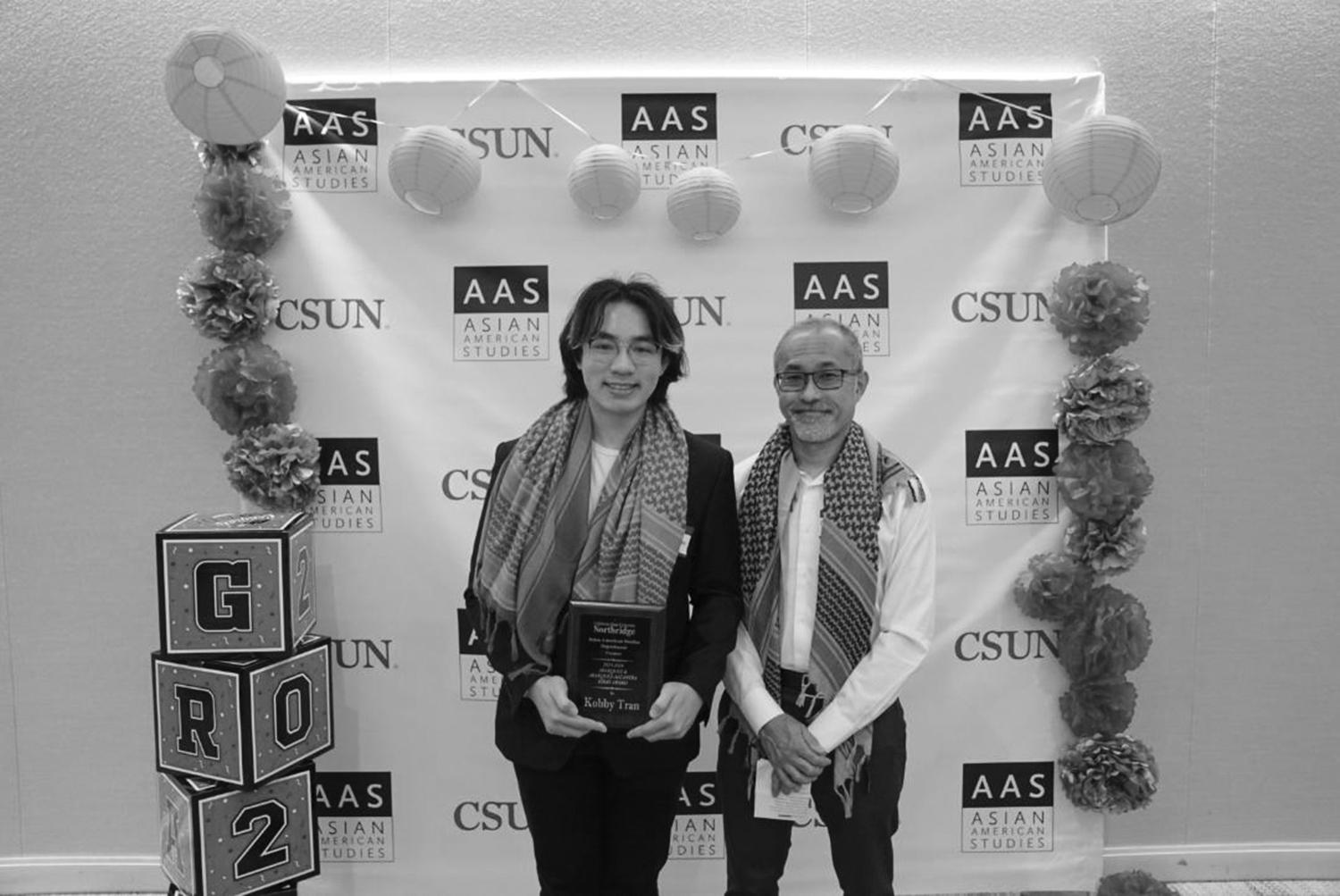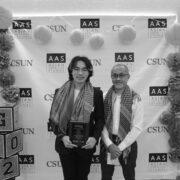Essay by Kobby Tran
Once a year, an essay competition is held at CSUN, amongst Asian American Studies and Education majors, as part of an endowment set up by Prosy Abarquez-Delacruz for her deceased mother, Asuncion Castro Abarquez and her deceased sister, Rosalinda Abarquez Alcantara. It was set up in 2016, to provide a scholarship grant to deserving students. The essay is vetted by Dr. Kimberly Teaman Carroll, Dr. Tomo Hattori, Dr. Phil Hutchison, and Dr. Joyce Pualani Warren. Thanks to the Asian Journal for being a partner in this endeavor.
Learning another language outside of your own opens many opportunities and offers an endless world of multicultural communication and understanding. Many children are exposed to a second language through different means, whether it’s through their parents’ exclusive use of their native language or the language used by surrounding speakers. Personally, my parents spoke to me in a mixture of Vietglish whereas the primary population of my hometown speaks English and Spanish. These types of environments can be formed through the formation of an ethnic enclave, a phenomenon where there is a large presence of a specific minority group. which draws that crowd in. Within these enclaves, the primary language that is spoken is determined by which ethnic community has the largest population. One example of this is Little Saigon in Westminster. Since many aspects of the mainland are built into the city’s foundations most noticeably in its population, it makes sense that the primary language of that specific community is Vietnamese.
As a second generation, bilingual English dominant, Vietnamese American student who frequented Little Saigon, I had a strong understanding from a young age of how Westminster was culturally different from my hometown north of it in Oxnard and a strong understanding of my Vietnamese upbringing overall. However, one factor that separated me from fully understanding my heritage was my inability to speak Vietnamese fluently. I and many Asian Americans are unable to speak their mother tongue. This ultimately leads to an inability to completely understand and immerse within one’s own culture since language, among other factors, plays a primary role in one’s understanding of the culture and its intricate nuances.
One example of my disorientation is during the time of Tet (Lunar New Year) where the younger generations receive a red envelope with money from the older generation to bring in a wealthy year. In exchange, the younger people bless the older generations with personal wishes. Most Vietnamese American children know the extent of saying Chuc murng Nam Moi (Happy New Years) when receiving an envelope, but most children don’t know that there are more phrases that can be said to elders to bless them with a more enriching year. Different blessings can include Surc khoe doi dao (to stay in good health), An khang thinh vurong (prosperity and security), and many more. Despite the vast variety of different blessings one can say to their elders, I only knew Chuc murng Nam Moi, the most basic greeting. I didn’t realize the importance of blessing at the time as a way to acknowledge the sacrifices they made throughout their lives to get me to a more fortunate place. A sense of guilt has crept up on me over the years due to my inability to bless the older folks on this very special holiday.
As a child, I gravitated towards English since it is the dominant language of my community. While I spoke to my family in basic Vietnamese, I never bothered to formally learn Vietnamese since, if I didn’t need to learn it, why would I want to? At times, I even resented my parents for not fluently speaking English for my own sake. It was not until the pandemic hit and Asian targeted hate crimes and rhetoric increased that I felt a spark of a genuine connection to my sense of my Vietnamese heritage. Before that, I understood the culture but wasn’t fully immersed in it. From that point, my desire to have a deeper understanding of my culture grew exponentially over the years since the year the pandemic hit. Before my realization, I had a relatively strong idea of what it meant to be Vietnamese American, but I didn’t have the linguistic ability to portray that in any capacity. Four years after my realization, my ability to communicate in Vietnamese has improved significantly but I am still missing so many cultural pieces to allow me the experience of living with the complete cultural context (as much as one can have for never entering the motherland). This was made apparent when I went to Vietnam for the first time in January 2024 to my father’s hometown of Da Nang. My inability to communicate with my relatives who have never left the country was jarring and alienating since there was little sense of connection. Even though I have never met these people in my life, I would have liked to get to know everyone that was considered important in my father’s life at one point, but since my Vietnamese ability is so low, there was no further conversation than simple greetings. No real connection could be made.
Certainly not every single Asian American child had the same experience, even my older sister has a much better cultural understanding of the Vietnamese experience because she has the language capabilities to have the conversations with my parents about the culture, they grew up in. Both parties have the common ground of speaking comfortably in Vietnamese to have more complex conversations and thus build a stronger bond since they can understand and relate to one another more fluidly. The same goes for my Japanese friend “A” who is completely bilingual. She is overall very close with her own family due to her ability to converse completely in Japanese. Since both parties (my sister and my parents as well as “A” and her family) are bilingual, both can communicate in either language as second nature, yet if one party is unable to speak the language comfortably, both parties end up losing on a much more enriching experience of community and cultural bonds.
This can be seen in the 2022 Academy Award winning film, “Everything Everywhere All at Once” starring Michelle Yeoh, where her character, Evelyn Wang, is an immigrant from China and each of the people that are close to her speak to her in a different language: Her father, referred to as Baba, speaks only Cantonese; her husband, Waymond Wang, is bilingual in Mandarin and English; her daughter Joy Wang is bilingual but English dominant. This multilingual household reflects the common experience in many Asian American families, where individuals may have varying degrees of bilingualism, like me and my sister who are both bilingual but English dominant. Further exploring the conflict in the film, it is revealed early on that Joy does not have a good relationship with her family, because she is unable to adequately converse with Evelyn since their degree of fluency in their non-dominant languages are opposite. The main conflict of the story is the cultural clash between Evelyn and Joy and the utilization of the language barrier is essential to tell the story accurately. In the beginning of the story, Joy attempts to communicate with Baba that she has a girlfriend in broken Mandarin, Baba retorts that her Mandarin is getting worse and Evelyn jumps in to say that Joy has a good friend rather than a girlfriend which makes Joy resent Evelyn for portraying her relationship inaccurately, thus further straining their relationship. Situations like Joy where the things that need to be communicated can’t are commonplace in many Asian American children’s households where the child cannot accurately express what their needs are. Further down the line, the people that were once unable to understand their own culture come to understand their need for it through some form, like where Joy realizes her frustration with being unable to express to Evelyn what she wants from their broken relationship.
Communication is a tool that people use to express ideas and thoughts which can ultimately lead to personal and wholesome connections. Language plays a massive role in representing oneself to another. Without the use of language, one would be unable to completely express themselves. This statement rings more true if you’re supposed to be bilingual due to your upbringing but aren’t. Language is supposed to be a tool to bring people together but if one lacks the ability to speak a language, the proper connections cannot be made. In my own life, to feel a better sense of belonging within my family and community, I make an effort to communicate to my parents strictly in Vietnamese so that I don’t alienate them any longer as opposed to my younger self’s reliance on communication through their broken English. That way, I can form a proper and fulfilling relationship with my parents and extended family next time I go to Vietnam.
* * *
The opinions, beliefs and viewpoints expressed by the author do not necessarily reflect the opinions, beliefs and viewpoints of the Asian Journal, its management, editorial board and staff.
* * *
Prosy Abarquez-Delacruz, J.D. writes a weekly column for Asian Journal, called “Rhizomes.” She has been writing for AJ Press for 13 years. She also contributes to Balikbayan Magazine. Her training and experiences are in science, food technology, law and community volunteerism for 4 decades. She holds a B.S. degree from the University of the Philippines, a law degree from Whittier College School of Law in California and a certificate on 21st Century Leadership from Harvard’s Kennedy School of Government. She has been a participant in NVM Writing Workshops taught by Prof. Peter Bacho for 4 years and Prof. Russell Leong. She has travelled to France, Holland, Belgium, Spain, Portugal, Japan, Costa Rica, Mexico and over 22 national parks in the US, in her pursuit of love for nature and the arts.







